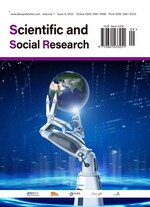Enlightenment of Excellent Chinese Traditional Culture Based on Confucianism, Buddhism, and Taoism on the Development of Modern and Contemporary Hypnosis Techniques
Abstract
Objective: To explore the enlightenment of excellent Chinese traditional culture based on Confucianism, Buddhism, and Taoism on the development of modern and contemporary hypnosis techniques. Methods: Using literature review and theoretical analysis, the relationship between the core content of Confucianism, Buddhism, Taoism, and modern and contemporary hypnosis techniques was systematically sorted out. Results: The Confucian thoughts of benevolence and the golden mean, the Buddhist wisdom of emptiness and Zen metaphor, and the Taoist naturalness and purity bring deep inspiration to the reconstruction of modern and contemporary hypnosis relationships, technical improvement, understanding of essence, and healing influence. While improving the development of Western scientific hypnosis techniques, including the difficulty of integrating hypnosis theories, it further promotes the construction of a Chinese hypnosis technique system that emphasizes integrity and harmonious balance. Conclusion: The excellent Chinese traditional culture based on Confucianism, Buddhism, and Taoism brings profound theoretical guidance and effective practical guidance to the development of modern and contemporary hypnosis techniques.
References
Zhang WS, 2018, Hypnosis Theory and Practice. People’s Public Security University of China Press, Beijing, 53.
Zhang WS, 2022, Hypnosis Masters and Their Classic Hypnosis Techniques. China Light Industry Press, Beijing, 2.
Zhang WS, Lian R, 2022, Exploring the Definition of Hypnosis: Deep Communication Characterized by Trance. Journal of Psychological Science, 45(1): 213–218.
Zhang WS, Xie ZW, 2024, Further Exploration of the Definition of Hypnosis — Deep Influence Characterized by Trance. Psychology Monthly, 2024(9): 221–224 + 228.
Li FQ, 2024, The Reconstruction of Traditional Confucian Ethical Civilization and the Construction of Modern Civilization of the Chinese Nation. Yunnan Social Sciences, 2024(4): 16–24.
Zhou AB, Wang ZD, 2011, A Review of Hypnosis Research from the Perspective of Cognitive Neuroscience. Advances in Psychological Science, 19(4): 537–544.
Wang JF, 2012, The Ethical Context and Contemporary Value of Confucius’ “Benevolence” Thought. Journal of South-Central University for Ethnicities: Humanities and Social Sciences Edition, 2012(3): 88–91.
Wickramasekera IE, 2015, Mysteries of Hypnosis and the Self are Revealed by the Psychology and Neuroscience of Empathy. The American Journal of Clinical Hypnosis, 57(3): 330–348.
Stephen G, 2007, Ericksonian Hypnosis Theory (Translated by Wang Jun, Tan Honggang, Wu Weili). World Book Publishing Company, Beijing, 46.
Zhang WS, 2022, Records of Solving Cases with Hypnosis. People’s Public Security University of China Press, Beijing, 114.
Fang LT, 2003, The Historical Evolution of the Meaning of “Emptiness” in Buddhism. Buddhist Studies, 2003(0): 78–88.
Gilligan, 2007, Ericksonian Hypnosis Therapy Theory. World Book Publishing Company, Beijing, 209.
Zhang WS, 2017, On the Application of Hypnosis in Teaching — Taking the Course “College Student Mental Health” as an Example. Journal of Public Security (Journal of Zhejiang Police College), 2017(5): 94–99.
Jia YY, Qian TQ, Wang R, et al., 2025, The Influence of Mindfulness Meditation Training on Negative Emotions and Sleep Quality in Patients with Depression. Journal of Clinical Psychosomatic Diseases, 31(4): 29–32.
Chang XZ, 2017, Study on the Influencing Factors of Sleep Quality and Case Intervention for Patients with Depression and Anxiety, thesis, Shanxi Medical University.
Wu TD, Liu JY, Liu DZ, 2025, A Case Report of Hypnosis Combined with Mindfulness Decentering Technique for the Treatment of Generalized Anxiety Disorder. Chinese Journal of Mental Health, 2025(8): 684–690.
Li Y, Xi MN, Shen HY, 2009, The Application of Mindfulness Meditation in Psychotherapy and Medical Fields. Psychological Science, 2009(2): 397–398 + 387.
Sun SJ, Su H, 2016, Looking at the Future of Hypnotherapy Research from the Historical Changes and Theoretical Development of Hypnosis. Journal of Southwest University for Ethnicities: Humanities and Social Sciences Edition, 37(11): 219–225.
Zeig J, 2009, Learning Hypnosis from the Masters: A Record of Milton Erickson’s Therapy. Chemical Industry Press, Beijing, 137.
Liu J, 2017, What is Nature? — Re-exploration of the Meaning of “Following the Natural Law”. History of Chinese Philosophy, 2017(2): 11–18.
Shen WH, 2022, The Positivity of Taoist “quietude” and its Role in Governing Both the Body and the Country. Journal of Huazhong Normal University: Humanities and Social Sciences Edition, 2022(6): 101–108.
Walters VJ, Oakley DA, 2006, Hypnotic Imagery as an Adjunct to Therapy for Irritable Bowel Syndrome: An Experimental Case Report. Contemporary Hypnosis, 23(3): 141–149.
Pan CY, Wang HY, Zhang TL, et al., 2017, A Case Report of Hypnosis Combined with Drug Therapy for Refractory Phantom Limb Pain. Chinese Journal of Mental Health, 31(2): 123–126.
Zhao ZX, 2018, Treatment of Obsessive-compulsive Disorder with Paroxetine Combined with Hypnotherapy. Chinese Journal of Health Psychology, 26(3): 328–330.
Luo AX, 2024, On the “Virtue” in Laozi’s Philosophy. Gansu Social Science, 2024(1): 11–23.
Zhao RH, Guo Y, Wu CJ, et al., 2024, Understanding the Growth and Decline of Yin and Yang in Traditional Chinese Medicine Based on Biofeedback. World Chinese Medicine, 19(24): 3860–3864.
Wang J, Tang YL, 2011, Discussion on the Concept of Health in Traditional Chinese Medicine. Journal of Traditional Chinese Medicine, 2011(12): 995–997.

